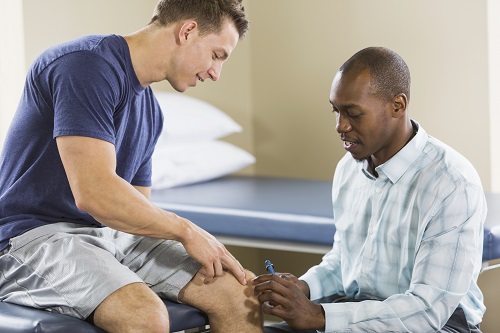What to Expect

Weeks 1-3
During weeks 1 through 3, you will become more independent. If you are receiving home therapy, you will need to be very faithful to your exercise program to achieve the best outcome.
Weeks 4-6
During weeks 4 through 6, you will see increasing mobility and will become more independent. Your home exercise program will be even more important as you receive less supervised therapy.
Weeks 7 – 12
During weeks 7 through 12, you should be able to begin resuming all of your normal activities.
Possible Complications of Knee Replacement Surgery
Knee replacement surgery is major surgery and although advances in technology and medical care have made the procedure very safe and effective, there are risks.
These risks should be considered carefully before you decide to have surgery. We encourage you to discuss the potential risks with your orthopedic surgeon, primary care provider and your family.
Every measure will be taken by our team of experts to minimize the risks and avoid complications. Although complications are rare, they do sometimes occur. We will do our very best to avoid the most common risks which include:
Blood Clots
Blood clots are more common in older patients, patients who are obese, patients with a history of blood clots, patients who smoke, and patients with cancer.
Infection
Infection is very rare in healthy patients having a knee replacement. Patients with chronic health conditions, like diabetes or liver disease, or patients who take some forms of corticosteroids, are at higher risk of infection after any surgery.
Nerve, Blood Vessel, and Ligament Injuries
Damage to the surrounding structures in the knee, including nerves, blood vessels and ligaments, are possible but extremely rare.
Wound Healing
Sometimes the surgical incision heals slowly, particularly if you take corticosteroids or have a disease that affects the immune system, such as rheumatoid arthritis or diabetes, or you are a smoker.
Limited Range of Motion
Within a day of surgery, you will begin exercises to help improve the flexibility of your knee. Your ability to bend your knee after surgery often depends on how far you could bend it before surgery. Even after physical therapy and an extended recovery period, some people are not able to bend their knee far enough to do normal activities such as reaching your feet to put on socks or tie your shoes.
Hematoma
Bleeding into the knee can occur either immediately after surgery or at a later time. This is accompanied by acute pain and swelling and is sometimes confused with infection.
Instability
After surgery, the knee may feel a bit unstable. This will normally improve as muscles regain their strength.
Loosening of the Joint: Over the long term, loosening of the artificial knee joint is the most common risk associated with total knee replacement. Loosening may occur when tissue grows between the artificial joint and your bone.
Pain Management Is Key to Faster Recovery
The orthopedic surgeons affiliated with the Joint Centers explain that the biggest positive change over the last several years in joint replacement surgery is in better pain management. Patients recover more quickly thanks to new pain management techniques that tackle nausea and help patients get up sooner, even the day of surgery. Most patients go home the day of surgery and start outpatient physical therapy soon thereafter.
The procedures and standards that Memorial Hermann Joint Centers follow before, during and after surgery exceed recommended guidelines. Our goal with knee replacement is to relieve pain and stiffness, restore the normal alignment of the knee and give patients a smoother, quicker recovery. Most patients finish physical therapy six to eight weeks after surgery, an improvement over the three-month average of five years ago.
Physical therapy requires commitment, but if you follow your regimen, you may be pleasantly surprised by the speed of your progress. Adding simple steps to your daily routine can help keep your new knee joints functioning well and lasting longer.
Find Relief from Joint Pain
Each year, Memorial Hermann Joint Center physicians perform more than 3,000 hip and knee joint replacement procedures, more than are performed at any other hospital system in the Greater Houston area.
If you're experiencing symptoms of knee pain and are seeking relief, Memorial Hermann Joint Centers can help. Our orthopedists see patients with everything from minor knee pain that requires rest and self-care, to those with chronic, serious knee pain, requiring a targeting non-surgical or surgical treatment plan. Find a location near you.
Let's get started.
Contact us to learn more about Memorial Hermann Joint Centers and pain-relief solutions. Submit the form below and the Memorial Hermann Joint Center navigator will reach out to answer your questions and help guide you down the path to a life with less pain.